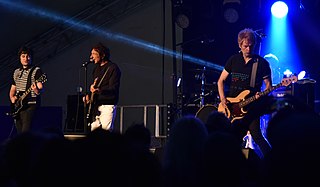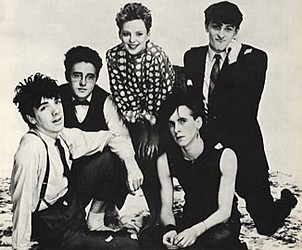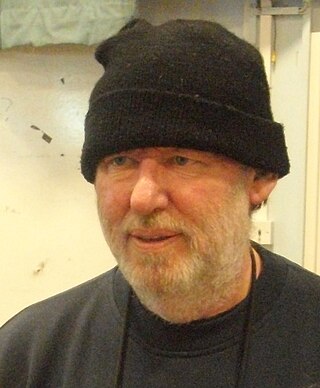
Buzzcocks are an English punk rock band that singer-songwriter-guitarist Pete Shelley and singer-songwriter Howard Devoto formed in Manchester in 1976. During their career, the band combined elements of punk rock, power pop, and pop punk. They achieved commercial success with singles that fuse pop craftsmanship with rapid-fire punk energy; these singles were later collected on Singles Going Steady, an acclaimed compilation album music journalist and critic Ned Raggett described as a "punk masterpiece".

Howard Devoto is an English singer and songwriter, who began his career as the frontman for punk rock band Buzzcocks, but then left to form Magazine, an early post-punk band. After Magazine, he went solo and later formed indie band Luxuria.

Pete Shelley was an English singer, songwriter and guitarist. He formed early punk band Buzzcocks with Howard Devoto in 1976, and became the lead singer and guitarist in 1977 when Devoto left. The group released their biggest hit "Ever Fallen in Love " in 1978. The band broke up in 1981 and reformed at the end of the decade. Shelley also had a solo career; his song "Homosapien" charted in Australasia and Canada in 1981 and 1982.

Dare is the third studio album by English synth-pop band The Human League, first released in the United Kingdom in October 1981 and then subsequently in the US in mid-1982. The album was produced by Martin Rushent and recorded between March and September 1981, following the departure of founding members Martyn Ware and Ian Craig Marsh, and saw the band shift direction from their previous avant-garde electronic style toward a more pop-friendly, commercial sound led by frontman Philip Oakey.

Another Music in a Different Kitchen is the first studio album by the English punk rock band Buzzcocks. It was released in March 1978 by the United Artists record label. This was the third line-up of Buzzcocks, with the guitarist Pete Shelley singing following the departure of the original vocalist Howard Devoto and then the firing of the bass guitarist Garth Smith. The album includes the single "I Don't Mind", which reached number 55 in the UK Singles Chart in May 1978.

Singles Going Steady is a compilation album by English punk rock band Buzzcocks, first released on I.R.S. Records in the United States on 25 September 1979.

Altered Images is a Scottish new wave/post-punk band who found success in the early 1980s. Fronted by singer Clare Grogan, the group branched into mainstream pop music, having six UK top-40 hit singles and three top-30 albums from 1981 to 1983. Their hits include "Happy Birthday", "I Could Be Happy", "See Those Eyes", and "Don't Talk to Me About Love".

Martin Charles Rushent was an English record producer, best known for his work with the Human League, the Stranglers and Buzzcocks.

Love and Dancing is a remix album by English synth-pop band The Human League, released in July 1982 by Virgin Records. Issued under the band name "The League Unlimited Orchestra" as a nod to Barry White's disco-era Love Unlimited Orchestra, the album was principally the idea and work of producer Martin Rushent and contains dub-style, largely instrumental remixes of songs from the band's multi-platinum selling album Dare (1981), along with a version of the track "Hard Times", which had originally been the B-side of the single "Love Action ". Rushent was inspired by hip hop turntablist Grandmaster Flash and created Love and Dancing on a mixing board. He created vocal effects by cutting up portions of the Dare tape and manually gluing them together. In total, over 2,600 edits feature on the album.

Modern is the sixth studio album by English pop punk band Buzzcocks. After the critical success of the band's previous album All Set (1996), the band became disillusioned with trying to be a rock band and set out to become more "modern," thus birthing the project. Recording the album in Chipping Barnet with the band's bassist Tony Barber producing, Modern sees a strong electronic music influence, with electronic instruments and drum machines featuring on the songs, especially those written by Steve Diggle, who wrote five of the album's songs whilst Pete Shelley wrote the other eight songs.

Stephen E Diggle is an English musician best known as a guitarist and later lead vocalist in the punk band Buzzcocks.

Love Bites is the second studio album by English punk rock band Buzzcocks. It was released on 22 September 1978, through United Artists Records.

A Different Kind of Tension is the third studio album by English punk rock band Buzzcocks. It was released in September 1979 by record label United Artists.

Operators Manual: Buzzcocks Best is a compilation album by English punk rock band Buzzcocks. It was released in 1991 by I.R.S. Records.

"Love Action (I Believe in Love)" is a song by the English synth-pop band the Human League, released as a single in the UK in July 1981. It became the band's first Top 10 success, peaking at number three in the UK singles chart.
"Homosapien" is a song by English musician Pete Shelley. It was the first single from his album of the same title, released in 1981, and his first single as a solo performer after rising to fame with Buzzcocks.

XL1 is the second solo album by Buzzcocks frontman Pete Shelley. It was released in 1983 and reached number 42 in the UK Albums Chart, remaining in that listing for four weeks. The single "Telephone Operator" charted at No. 66 in the UK Singles Chart, making it his biggest single release there. The original release was packaged with a computer program for the ZX Spectrum which displayed lyrics and graphics in time with the music.
Stephen Garvey is an English musician who is known for being the bass guitarist of the punk band Buzzcocks, forming part of the classic line-up of the group, from 1977 to 1981, and, again, from 1989 to 1992.

"Ever Fallen in Love (With Someone You Shouldn't've)" is a 1978 song written by Pete Shelley and performed by his group Buzzcocks. It was a number 12 hit on the UK Singles Chart and was included on the album Love Bites.

Sky Yen is the first album recorded by English musician Pete Shelley, recorded in March 1974 and released by his label Groovy Records in April 1980. It is Shelley's earliest known recording, and was created when he was in college. After developing an interest in electronic music, Shelley created a single electronic oscillator with an added potentiometer, and recorded the album on the device in his living room while utilising a two-track stereo recorder. The entirely electronic album is experimental in style, and emphasises oscillations and drone characteristics.


















